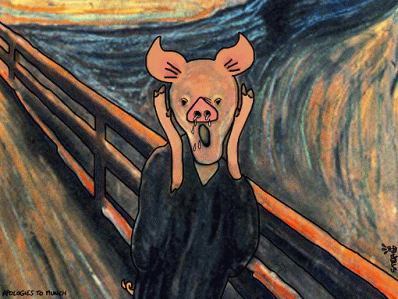
'APOLOGIES TO MUNCH'S SILENT SCREAM'
[Hoje Macau, Macau]
Excelsior, Mexico
Why are People Dying in Mexico, But Not the U.S.?
"I
have always preferred the Mexican health system, which is much less rigid. Ö On
this occasion, I'm afraid that, shocking as it is, we should conduct ourselves
more like people from the United States than Mexicans."
By Leo Zuckermann
†††††††††††††††††††††††††††††††††† 
Translated By Halszka
Czarnocka
April 28, 2009
Mexico - Excelsior - Original Article (Spanish)
While in Mexico more over 100
people have died in the epidemic of swine flu, out of twenty cases that have
appeared in the United States, none have been fatal. At the moment, there is no
scientific explanation for this disparity. Nevertheless, I suspect that it has
to do with the difference in health care systems of the two countries. I've had
an opportunity to live on both sides of Rio Bravo and consequently I'm familiar
with both systems. I have fallen ill here and there, and can assure you that
these are two very different worlds.
Here's an example: When I get
a fever in Mexico, I telephone my doctor. He's a friend who knows me perfectly.
He asks me about my symptoms, makes an initial diagnosis and usually issues me
a medical prescription over the phone. He only asks me to come see him if he
thinks my condition is very serious. I donít even go to a pharmacy to buy my
medication. I call them and they send it to me at my home without even asking
for the prescription. I take my pills, get well and continue with my life. One,
two, three, the fever is gone and the story is over.††
Posted
by WORLDMEETS.US
Since people who use the public
health system have to wait on endless lines to see a doctor, they only go when
they are gravely ill. If their symptoms are mild, as in my case, they call a
doctor friend or self-medicate. Many will consult a pseudo-doctor or drugstore pharmacist.
This type of treatment is
unthinkable in the United States. When I had a fever there, I called my doctor.
I usually couldn't find him and so my phone call was answered by the doctor on
call. I told him my symptoms and all he would tell me was to come to the clinic
the next day or, if I felt really bad, to go to the emergency room of the
nearest hospital. He never gave me a diagnosis over the phone; much less issue
me a prescription.
This isnít
because it isn't allowed. For the most part, it's because doctors in the United
States live in constant terror. If they make a mistake, the patient can sue
them and win an ungodly amount of money. In this way, the incentives of the U.S.
system render physicians extremely cautious. It's not by chance, then, that all
the sick end up coming to see their doctors, which, incidentally, is very
expensive for society. In their offices or in the hospital, doctors order a
multitude of tests to be absolutely sure of their diagnosis. Moreover, they
have to maintain precise records and report to authorities if they uncover an
epidemic disease. If they donít, once again, they are exposed to multimillion dollar
suits.
Posted
by WORLDMEETS.US
Here, I believe,
is the answer. In Mexico, only the most serious cases reach a doctor and,
ultimately, the hospital. These are people who have been sick for a long time and don't
respond to the drugs they've been taking. In this epidemic, I would imagine
that those who actually see a doctor are in an advanced stage of the illness.
And since anti-viral medications work only if influenza is detected in its
initial stages, many of these patients end up dead. That doesn't happen in the
United States, where, for the systemic reasons I have described, the less
serious cases are immediately detected. And so treatment can begin with anti-viral
drugs that are extremely effective in those initial stages.
I have always preferred the
Mexican health system, which is much less rigid. I particularly like the
personal relationship we have with our doctors. And yet, on this occasion, I'm
afraid that, shocking as it is, we should conduct ourselves more like United Statesiens [people from the U.S.]
than Mexicans. It goes against our customs and mores, but in this epidemic of a
potentially deadly virus, it is extremely important to see a doctor as soon as
the first symptoms of the illness occur. And under no circumstances should you
wait to become a total ruin before going to the hospital.
CLICK HERE FOR SPANISH VERSION
[Posted
by WORLDMEETS.US April 29, 5:49pm]